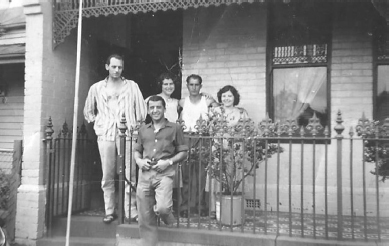Ugo’s Tale
Dear Reader,
When you leave your homeland, you leave behind the people you know, the people your mother and father knew, your grandfathers and grandmothers, brothers and sisters, cousins, uncles and aunts and neighbours, the people who know who you are immediately because you look like your father. You leave behind the courtyards, the roads, the lanes, the houses, the colours of the houses, the rows of houses, the names of small groups of houses, the shapes of the houses, the rooms in the houses, the stairs, the stones, the dreams that inhabit the stones, the fields, the walking paths, the irrigation ditches, the hills and the swamps, the grasses, the plants, the birds, the crops, the stables, the cows, the pigs, the rabbits, the chickens, the church, the belltower, the cemetery and the language you were born into, that is deep in your heart, and all the things that happened that anyone can remember.
Most importantly, you leave behind one thousand memories. You embark on a ship in Genoa and disembark on the other side of the world, and your life is a clean slate. You cling to a wife or a husband and to the children, if you have them already, or if you can you bring some into the world to fill the emptiness.
You abandon one thousand memories and you end up walking the streets of North Fitzroy, you, with your unusual name that no-one can pronounce, you, speaking a language no-one can understand.

What do you do with the memories you left behind and the need to tell the stories of your life and your ancestors’ lives to your children? What if the only stories you have to tell are of people and places on the other side of the world? What if after a lifetime you still wonder whether you made a monumental, irreparable mistake by emigrating to Australia?
Normally the people you live with share the same memories and stories. So who can you share yours with, the stories that in the village of your birth are in the skin of the people and the memories that are in the stones?
I was born in Tuscany, in the province of Lucca, in a small village in the municipality of Capannori, named after its patron saint, San Ginese. Physically the area consists of small hills, all of which are well cultivated with vineyards and olive groves. It was paradise. While it is no longer so well looked after, it is much loved by the German and English visitors who have their summer homes there.
I was born on 20 December 1927. I left for Australia on 1 January 1957. Others of my family had emigrated before me: my grandfather and my father. Both emigrated to the United States of America, but both returned to Italy after some good fortune (that is, after making some money) and both died in Italy. A brother of mine emigrated to Australia but returned to Italy after just a few years and died there too. I have been back to Italy many times and while my father was alive he would always say to me: ‘Why did all the others in the family who emigrated return to their native land to die and you refuse to?’ My father was very sad that I would not follow in their footsteps.
I now want to go into some detail about what my father said of the day I was born. I was born at eleven o’clock at night. As you know, in those days women did not go to hospital to give birth. If all went well, they would give birth at home. They were assisted during labour by a woman who had some expertise in delivering children – a midwife.
An hour before I was born, there was a great storm that did not stop until two hours after my birth. My father used to say that because I was born on a stormy night I behaved differently to those who preceded me and that is why I would not return to San Ginese to die.
…
Some of these tales, dear reader, are set in the olden days, some in more recent times. All the tales are true. Most of them unfold in a hamlet of San Ginese called Villora. You may search for a map and images of this place and they will exist, but you will never find it. Just as migrants do not ever truly arrive at their destination, so those who remain behind disappear and become untraceable.
I have tried to write these tales to the best of my ability, but I am not a writer. Furthermore, some tales were recounted to me by others who had experienced directly the events described therein (sometimes with me as the protagonist), and some were given to me in written form, so I have simply reproduced them here with some minor changes. The tales are therefore told by many Italian voices.
Finally, although my Italian has deteriorated over the years, still I felt a strong desire to write in the language of my ancestors. I therefore sought out a translator expert in the writing of immigrants to translate my own work and the work presented to me by others into English. I entrusted to him a task that went beyond mere translation, and hope that you will find it satisfactory. I believe he was the right person for the work. Even now you are reading his words.
It is worth remarking that if these tales had not been written, the people in them and the events that befell them would have faded into boundless oblivion.
Ugo, age ninety years